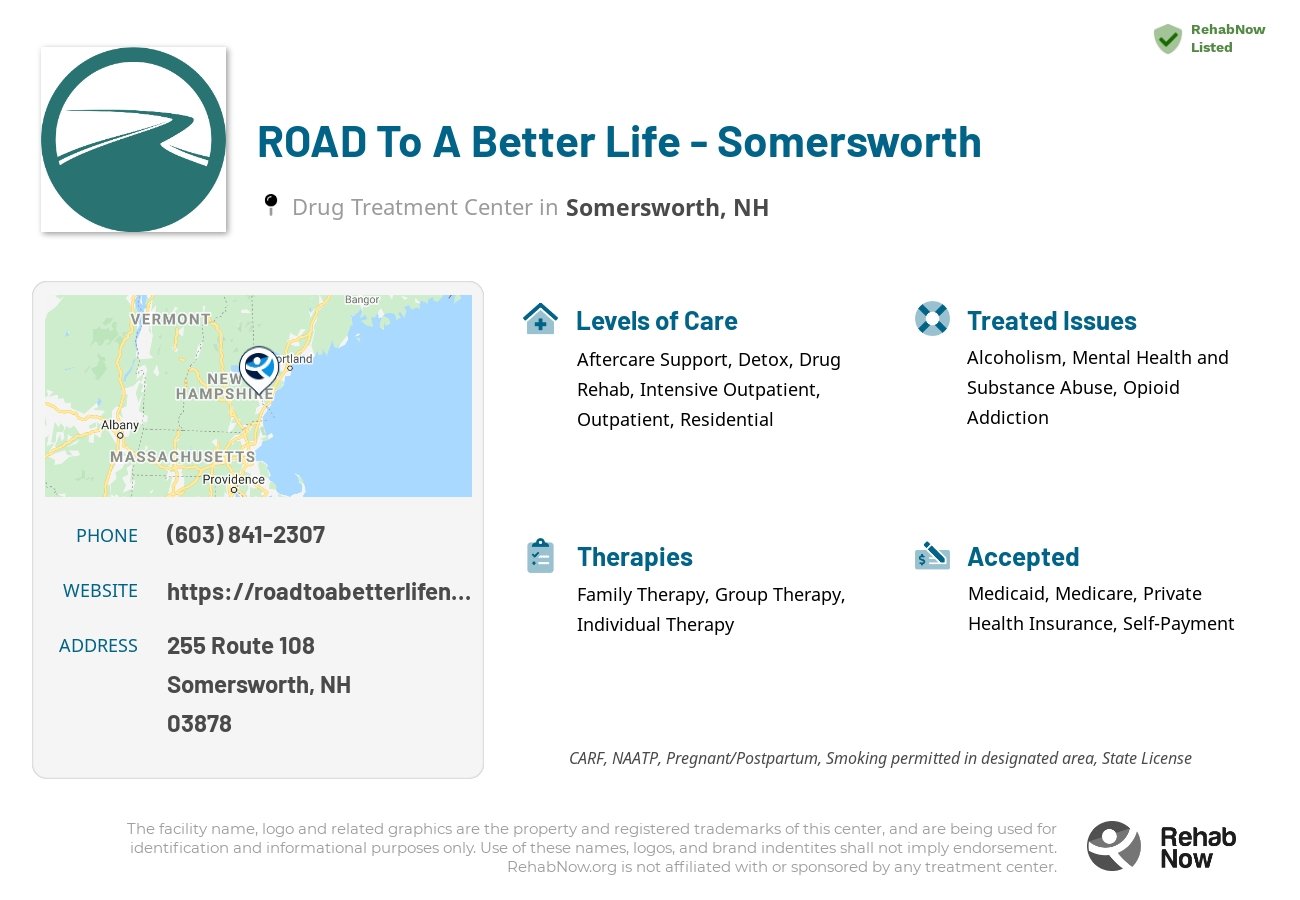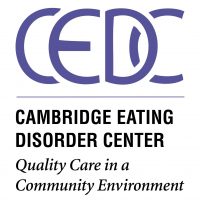ROAD To A Better Life - Somersworth
Drug Rehab Center in Somersworth, New Hampshire
Somersworth provides comprehensive, personalized drug rehab services including residential, intensive outpatient, and outpatient levels of care that are tailored to each individual's needs and include evidence-based treatments to help them lead a healthier and sober life.
About ROAD To A Better Life - Somersworth in New Hampshire
ROAD to a Better Life in Somersworth, NH, stands out as a comprehensive outpatient addiction treatment facility. It's part of a network with 7 locations across New Hampshire, focusing on achieving permanent freedom from drug and alcohol addiction. The facility is known for its abstinence model, personalized care plans, and a supportive, professional environment.
- Personalized Care Plans: Each client receives a tailored care plan designed to meet their unique recovery needs.
- Comprehensive Support: From intake evaluation to aftercare planning, the facility offers a full spectrum of services to aid in recovery.
- Professional Environment: Staffed by addiction professionals, the center provides a respectful and friendly setting for recovery.
Accredited by SAMHSA, ROAD to a Better Life emphasizes recovery and relapse prevention, aiming to return clients to normalcy. The facility's approach is grounded in listening, taking suggestions, and making real-life changes, supported by a team committed to each client's well-being.
Specializing in the treatment of alcoholism, opioid addiction, dual diagnosis, and drug addiction, ROAD to a Better Life - Somersworth employs a variety of treatment methods. These include group therapy, family involvement, and aftercare planning, ensuring a comprehensive approach to addiction recovery.
Genders
Ages
Modality
Additional
Accreditations
SAMHSA
Conditions and Issues Treated
Opioid addiction is a common form of addiction, often caused by prescription drugs that are abused. Addiction is treated by detoxifying the body and following up with therapies to correct behavior and target the root of the problem.
Most opioid addiction begins with patients being prescribed painkillers after an injury or surgery. The body becomes used to the chemicals in these medications and soon no longer responds to their presence. As a result, addicts seek out stronger opiate-based medications like Oxycodone to compensate for the lack of effectiveness.
The most dangerous aspect is that these addictive behaviors often get carried over onto illicit drugs like heroin, which are increasingly potent and result in lower life expectancies.
Levels of Care Offered
This center offers a variety of custom treatment tailored to individual recovery. Currently available are Aftercare Support, Detox, Drug Rehab, Intensive Outpatient, Outpatient, Residential, with additional therapies available as listed below.
Detox is the body’s process of removing toxins. In substance abuse, detox refers to the process of getting rid of drugs already present in the system once the patient stops further intake. Detox is the initial recovery step. Physiological drug dependence over time can lead to symptoms of withdrawal. Depending on the symptom severity, the detox process is managed either medically or clinically. While medically assisted detox relies on specific medicines, clinical or social detox relies on providing the patient with emotional and psychological support.
Intensive Outpatient Programs (IOPs) are a form of drug treatment that allows individuals to receive the therapy they need while remaining in their homes and community. IOPs allow for the flexibility to continue working and living at home while still meeting treatment demands.
Outpatient treatment programs are less intensive than an inpatient program. Participants live at home while working or going to school. Benefits include being able to continue relationships with family, friends, and work/studies. Treatment includes educating patient on addiction to drugs, medication, and counseling. Benefits include being able to continue relationships with family, friends, and work/studies. Treatment includes educating patient on addiction to drugs, medication, and counseling. Counseling sessions are for either individual or group.
Residential treatment programs are those that offer housing and meals in addition to substance abuse treatment. Rehab facilities that offer residential treatment allow patients to focus solely on recovery, in an environment totally separate from their lives. Some rehab centers specialize in short-term residential treatment (a few days to a week or two), while others solely provide treatment on a long-term basis (several weeks to months). Some offer both, and tailor treatment to the patient’s individual requirements.
Aftercare Support in drug rehab is crucial because it helps people stay sober after treatment. The benefits of Aftercare Support are that it provides a pathway that will help people get sober for life. It supports healing at all levels, physical, mental, emotional, and spiritual.
Therapies & Programs
Individualized Treatment is essential because it gives addicts the ability to participate in a program that meets their unique needs. An addict should work with professionals who understand what they’re going through, especially if the addict is actively using.
Trying to find a treatment program that meets your needs can be challenging. It’s even more complicated if you don’t know what kind of treatment you need. Being able to have professionals who are experienced with treating your situation is key to getting sober. Finding the right treatment program for an addict is difficult, but it’s even harder without communicating with those who have experience treating your specific situation.
Family dysfunction can often be the underlying cause of substance abuse. To get sober, you need to find a different way to cope with the pain in your life. Family therapy can help you and your family deal with old issues that may trigger substance abuse. It will help everyone understand why each member of the family feels and acts the way they do. It can give everyone new tools to manage their emotions so that they don’t want to drink or do drugs.
A person looking for drug recovery should know that group therapy is an essential tool. Group therapy provides accountability and friendship to people with addiction. It is recommended as a lifetime treatment habit. Group therapy occurs in a group setting as opposed to a one-on-one setting. It benefits patients by providing a feeling of support and letting them know they are not alone. Patients at ROAD To A Better Life - Somersworth also learn to build trust and understanding and gain perspective through discussions.
Cognitive behavioral therapy (CBT) is a type of psychotherapeutic treatment that is focused on changing negative ways of thinking that contribute to addictive behavior.
Cognitive behavioral therapy is beneficial for:
- People who are seeking to overcome addictive behavior
- Those who struggle with addictive behavior and mental illness
- People who have a genetic history of addiction in their family
- Those who don’t want to depend on medications
- Those who need a more practical treatment approach
Life skills training is beneficial for addicts in recovery because it helps them learn how to take care of themselves and improve their quality of life, which can promote feelings of purpose and motivation.
This type of treatment works by teaching individuals life-enhancing skills that support positive living, including:
- Healthy lifestyle habits
- Skills to effectively manage stress
- Effective communication skills to help them get their needs met without turning to drugs or alcohol
- Money management and budgeting skills so they can continue to take care of themselves after treatment ends.
Payment Options Accepted
For specific insurance or payment methods please contact us.
Is your insurance accepted?
Ask an expert, call (888) 674-0062
ROAD To A Better Life Associated Centers
Discover treatment facilities under the same provider.
- ROAD To A Better Life - Merrimack in Merrimack, NH
- ROAD To A Better Life - Concord in Concord, NH
- ROAD To A Better Life - Wolfeboro in Wolfeboro, NH
- ROAD To A Better Life - Lebanon in Lebanon, NH
- ROAD To A Better Life - North Conway in North Conway, NH
Learn More About ROAD To A Better Life Centers
Additional Details
Specifics, location, and helpful extra information.
Somersworth, New Hampshire 3878 Phone Number(603) 841-2307 Meta DetailsUpdated April 15, 2024
Staff Verified
ROAD To A Better Life - Somersworth Patient Reviews
There are no reviews yet. Be the first one to write one.
Somersworth, New Hampshire Addiction Information
Opioids such as fentanyl, heroin, and prescription opioids form the largest drug threat in New Hampshire. More than 80% of all New Hampshire treatment centers admissions were related to one or more of these three drugs. Opioids such as fentanyl, heroin, and prescription opioids form the largest drug threat in New Hampshire. Since 2002, rates of alcohol dependency have also been among the highest in the country. In 2015, almost 15% of the residents were admitted to treatment centers for alcohol abuse.
17.2% of people over the age of 12 abuse alcohol or drugs in Somersworth, New Hampshire. In 2016, there were 97 drug-related arrests in Somersworth, New Hampshire. This is significantly higher than the state average of 60 per 100,000 residents. Various treatment options are available for those looking to get sober. These options include inpatient rehab, outpatient rehab, and 12-step programs.
Treatment in Nearby Cities
- Warren, NH (68.1 mi.)
- Concord, NH (32.4 mi.)
- Winchester, NH (82.1 mi.)
- Littleton, NH (84.9 mi.)
- Antrim, NH (54.7 mi.)
Centers near ROAD To A Better Life - Somersworth
The facility name, logo and brand are the property and registered trademarks of ROAD To A Better Life - Somersworth, and are being used for identification and informational purposes only. Use of these names, logos and brands shall not imply endorsement. RehabNow.org is not affiliated with or sponsored by ROAD To A Better Life - Somersworth.












